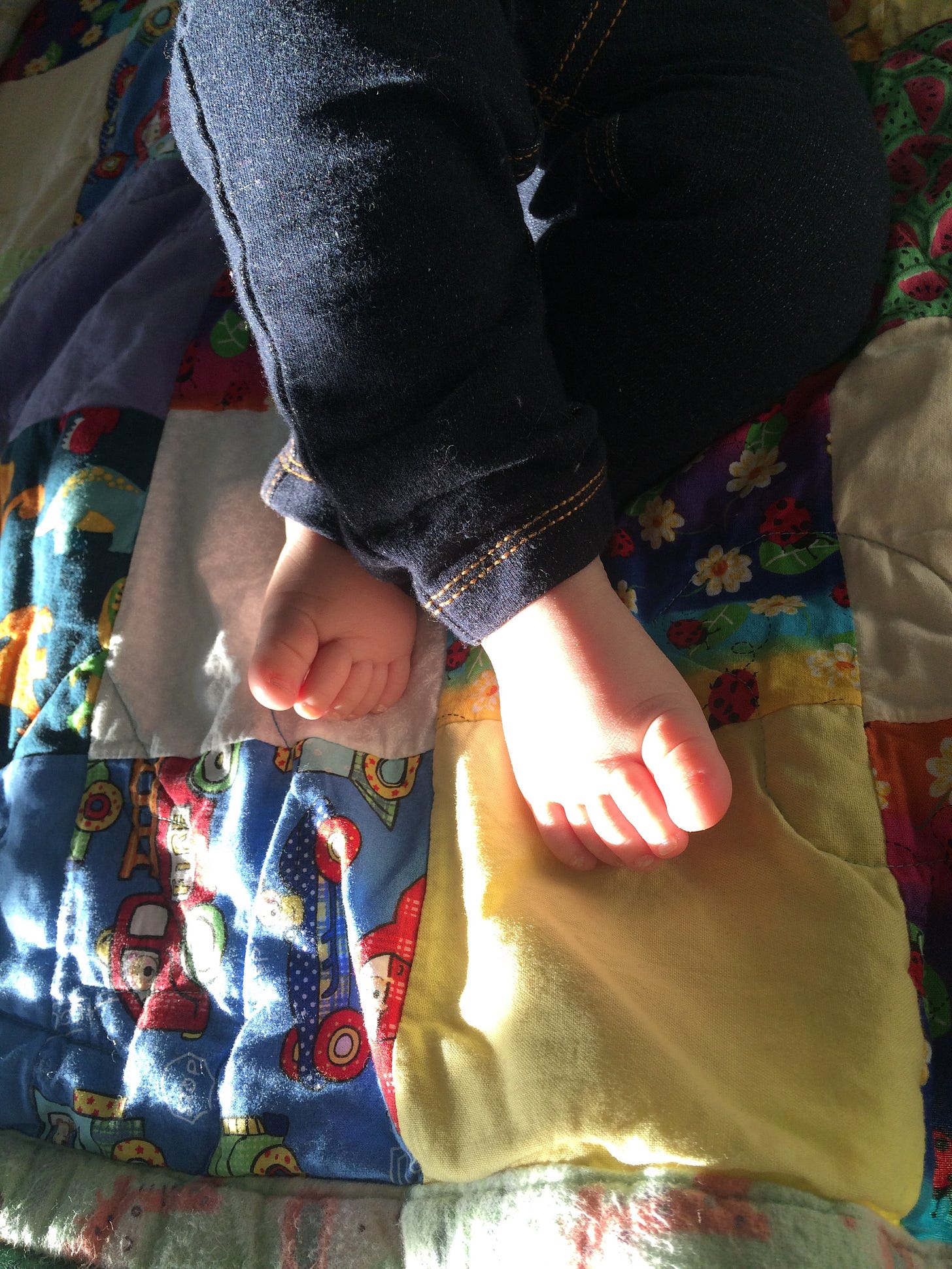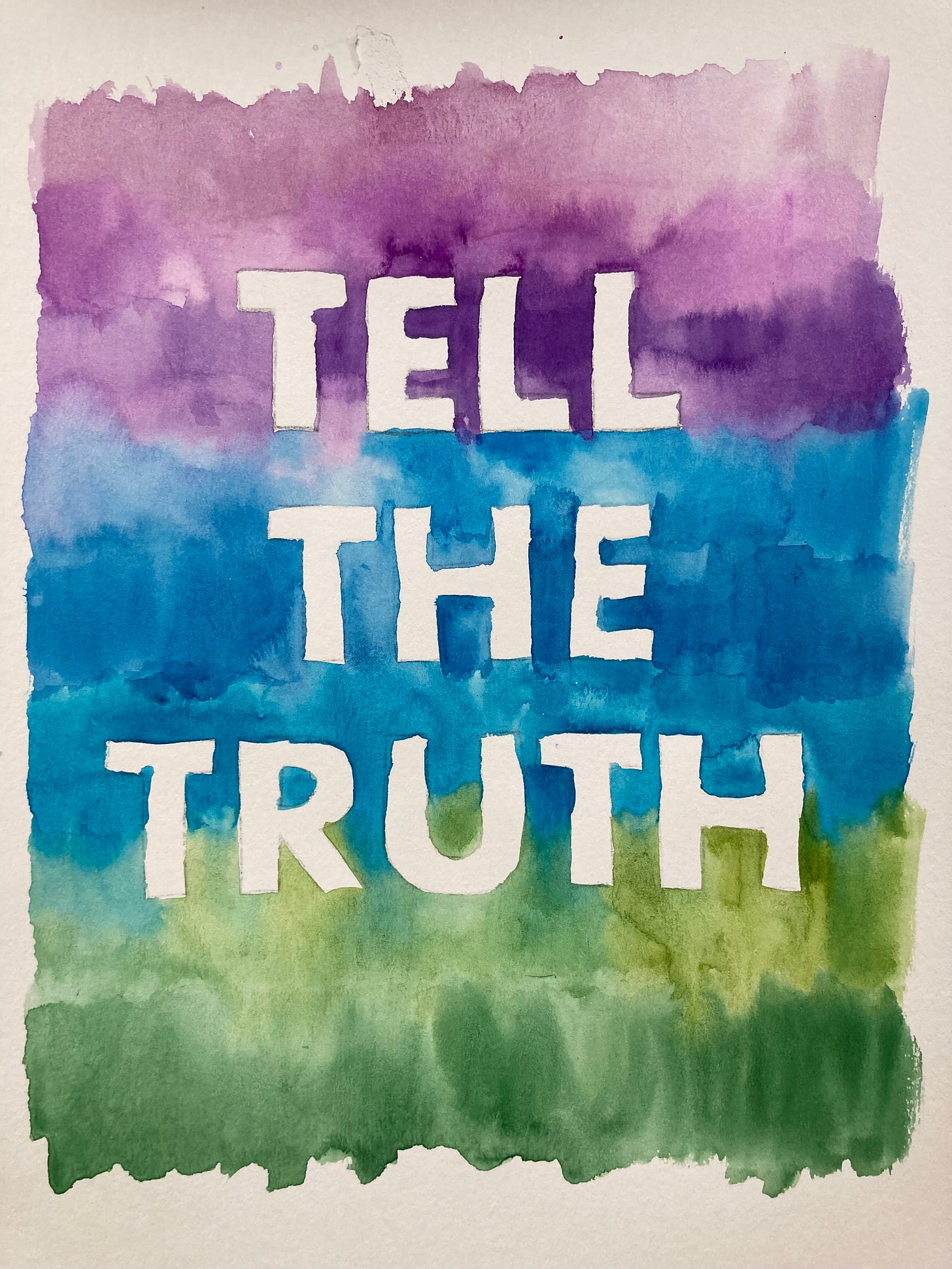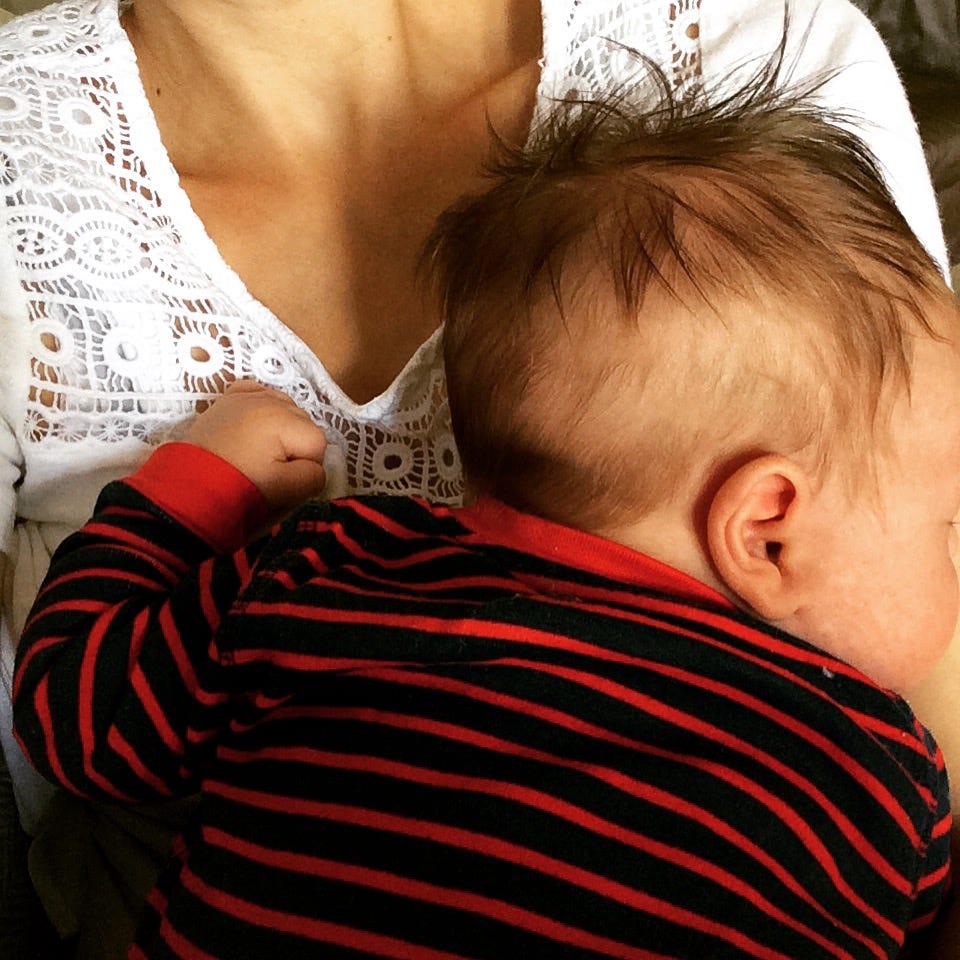"Truth, beauty, justice, compassion are always and everywhere good."
Preparing for an inauguration with Simone Weil
The last time this man was elected to the US presidency, I felt it as a searing pain in my left elbow. The night of the 2016 election, I was up every hour or two to nurse a fussy five-month-old who was just over a week out from major emergency eye surgery. Because one eye had haemorrhaged post-surgically, we had to keep him upright at all times, even in sleep, even while nursing, even while nursing every hour or two through the night.
I’m right handed, so my left arm had taken the brunt of the extra carrying. That night, I would check the news every time I sat up, ramrod straight, to soothe this baby, feeling myself increasingly un-soothed in the eerie blue light of my phone’s screen.
People I loved had voted for this man, knowing that he had mocked disabled people, dehumanized migrants, spoken abusively of women’s bodies, lied and cheated. They said they did it for babies, knowing (willfully ignoring?) that he would likely implement policies that further hurt my hurting baby and many others. Christians who had taught me to value righteousness and integrity wove justifications that boggled my mind. I had known the world was full of injustice—believe me, I had known—but this scale of betrayal was new to me. It took up residence in my joints and hasn’t left.
And now it has happened again. This time, we all know how much he lies. This time, we’ve seen even more of the rhetoric, the fear-mongering, the xenophobia, the nepotism. We’ve seen proven accounts of sexual abuse. We’ve seen a violent attempted insurrection. I could go on, but you know.
And still, it has happened again.
My baby is eight years old and full of light. We went for annual eye exams last week, and everything is stable. His glasses frame eyes full of love and joy and curiosity at the world. He does not know, yet, how much of it is burning.
Last week one of my classes discussed Simone Weil’s 1942-1943 essay “Human Personality,” which responds in part to the question of how France should rebuild a healthy society after the Nazi invasion. Some philosophers were arguing that ethics and politics should start from the premise that every human is unique and holds inherent human rights. But Weil points out that a right is not a guarantee to justice, because rights are often unevenly applied.
Instead of our uniqueness and our inherent rights, she argues, we should begin with our vulnerability: each of us knows deep down that we ought not be hurt.
We know, even as newborns, that when we are hungry, we should be fed, so we cry. We cry, too, for comfort. There is something in us that feels injustice in our very bones, because we know it is wrong for us to be wounded. This sense can be dampened through neglect and trauma, but Weil insists the tiniest flickering pilot light remains throughout our lives.
We can build a fair and flourishing society out from this premise, then, she claims: we should build a world in which no one is hurt. Weil meant this advice most immediately for French society, but she was committed to its universality. There are no humans in the world who deserve to be hurt more than any others do. There are no societies or cultures or countries that should be first or greater. This commitment is one reason why Weil was among the few European intellectuals speaking up against colonization in her time.
When people are hurt, she says, their hurts should be addressed, thoroughly and equitably. To this end, she argues that we should build a society with strong public education that ensures everyone learns to think critically and voice their experiences. We should make places for people to be heard when they suffer or are harmed—fairer justice systems, for example, that aren’t biased toward those with privilege. We should put leaders into place who will listen with compassion and integrity to those who are afflicted.
It wasn’t hard for my students to see, once we started talking, how clearly Weil’s words speak to our time.
Weil was suspicious of political parties because they prioritize maintaining their own power. They might do this because they believe keeping their party at the helm is better for society in the end, but the lengths they go to keep and increase that power often harm people. She was suspicious of human rights discourse because it often leads us to argue for what’s rightfully ours rather than seeing the other with love, asking how we might love our neighbour, even when they are different from us, even when they are our opponent. She was suspicious of getting too comfortable in democracy because she recognized that it didn’t necessarily protect society from dictatorship.
Weil suggested that to build a fair and flourishing society, we should see behind these “middle values” (rights, democracy, personality) to the eternal ones: justice, truth, beauty—all of which she links repeatedly to love.
Of course this can sound idealistic and abstract, but she means it very concretely. (This is why many scholars call Weil a uniquely materialist Platonist.) And I realized yesterday, as we discussed the essay in class, that this insight aligns with lessons about communicating across polarization I’ve learned from various sources over the years. One way we can start to talk to each other when we disagree is to identify the values we share, which are so often those big values Weil advocates we centre.
I have to take a deep breath to do this work, but here goes. I have been trying to understand why people voted for Donald Trump: I’ve been reading, listening, thinking, for years, about this question. I see that people are afraid. The world is changing very quickly, and things have gotten harder for the majority of us—financially, socially, emotionally. My sense is that many folks voted for Mr. Trump because they want change: they want strong leaders to make things different than they are, better than they are.
I want to honour these fears and these wishes. The world feels increasingly unstable to me, too. I want good governance, leaders who can guide us through troubled times, too. I want stability and security, too. I want affordable groceries and housing, good healthcare, safe streets, steady jobs.
We have felt harm. We want to flourish, and we want our children to flourish. We want goodness in the world.
I think we share these values.
Once we start with our shared values, we will also have to tell the truth of where we differ. I do not think a Trump presidency will answer to these longings. It may benefit some, but I strongly suspect it will harm many others. I would love to be wrong about this. If you, dear reader, who may very well be beloved to me, voted for Donald Trump or supported him from a distance, I think you were grievously wrong to do so. But I think you did so in large part because of the circulation of lies (not truth) perpetuated by broken systems (not justice). I do not intend to be condescending. We are all enmeshed in a sticky web of informational manipulation.
Still, that’s not to say that everyone is equally misled, that every party is equally corrupt, that there is no truth or goodness or beauty we can access, or that there aren’t practices that can bring greater clarity and discernment. Weil ends her essay by saying that we must “invent” new institutions for the purpose of “exposing and abolishing everything in contemporary life which buries the soul under injustice, lies, and ugliness.” I don’t think any of us trust our governments at this point to create such institutions for us, and I’m more suspicious of censorship than Weil was. There are risks here. But I’ve been thinking about personal and communal practices that can help us expose injustice, lies, and ugliness.
Here’s one: a few questions inspired by Weil’s proposed values. These questions are for all of us, of every political stripe, to help us assess the information we take in, especially as new figures occupy US (and Canadian, and world) halls of power and as AI and other kinds of misinformation increasingly muddy our waters.
Is this information true? Can I fact check it in a reliable place? Who stands to benefit if I believe it?
What feelings does this information provoke in me: Delight? Outrage? Fear? Overwhelm? Contentment? Are these feelings a good place from which to believe and/or act?
Does this information confirm what I already believe, or does it challenge me in some way? Could I find another take on the story that challenges me, and then sit with the different accounts?
Am I taking in too much information to actually process it? Would it be a good idea to set new limits around my news intake?
Does this information lead me to see the humanity of my fellow humans, or does it cloud their humanity? Does it let me see the beauty of my fellow humans, even through our differences, or does it cloud their beauty?
Does this take on things add to the general ugliness?
Will it make the world more beautiful for some than for others?
Is this information just? Is it fair?
Does it encourage me to care about justice or fairness only for a certain group of people—my family, my social class, my city, my country—at the expense of others, especially those who are more vulnerable than I am?
Does this information honour the realization that every human knows, deep down, that it is wrong for them to be hurt and that we should act accordingly?
If I believe I am to love my neighbour, does this information encourage me to do so? (Do I believe I am meant to love my neighbour? And who is my neighbour?)
On Monday, I am going to pray. I am planning to cry a bit, if tears come. I’m also going for physical therapy on my jaw and neck, which hold a tension that bears witness to a thousand wrongs. I will work to prepare my classes, check in with friends more than usual. I will try to make something beautiful at some point: maybe a few stitches in my blue Ohio Star quilt, maybe a little mediocre watercoloring. It’s pasta night, so I might make a gluten-free lasagna and toss a salad with walnuts and feta. Maybe I’ll pull out the chocolate hazelnut ice cream for dessert. By nine o’clock, I’ll be in bed, reading something beautiful and true. The next morning, I’ll wake up and stretch my sore left arm and all the rest of me, too, and keep going in a spirit of the fiercest love.
How about you?







Thanks for this, Cindy. Like you, I tend to think (hope?) that many of the people who supported Trump did so out of (a largely mistaken) sense of fear, or because of misinformation, rather than from malice (or darker urges), though I'm not sure if this is actually true or not. But I love the concrete questions you pose here.
I wrote (somewhat obliquely) about the darkness of this election, and the need to push back against the desire for safety and certainty that played a role in it, for the Jesuit Media Lab: https://jesuitmedialab.org/the-spiritual-and-political-wisdom-of-george-saunders/
Hmmm... I like Weil's thinking here. "Invent" new institutions “exposing and abolishing everything in contemporary life which buries the soul under injustice, lies, and ugliness.”
I suppose Europe had to completely rebuild after the wars anyway. Perhaps this is the task that we all do, whether our institutions are intact or not, we keep reinventing them, digging out the ugliness that seeps in and replacing it with beauty. Institutions seem to need regular gardening, weeding, replanting. And we each have a little plot in the giant patchwork.